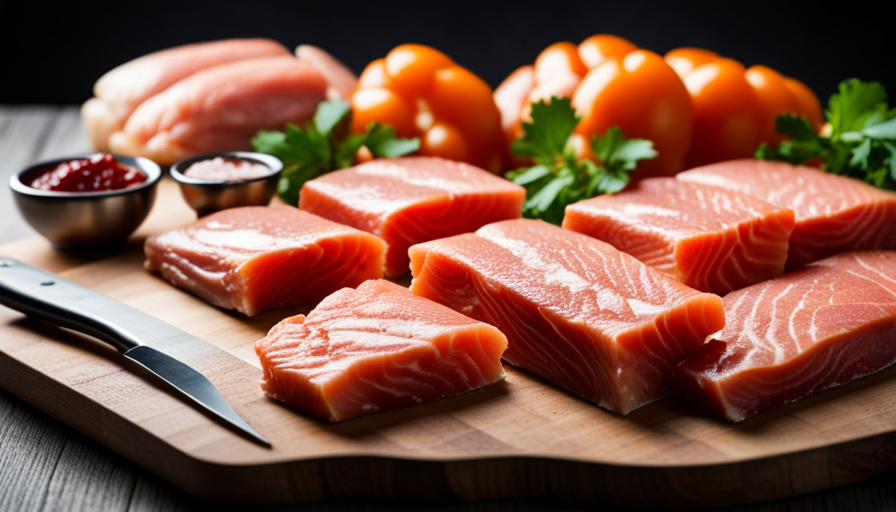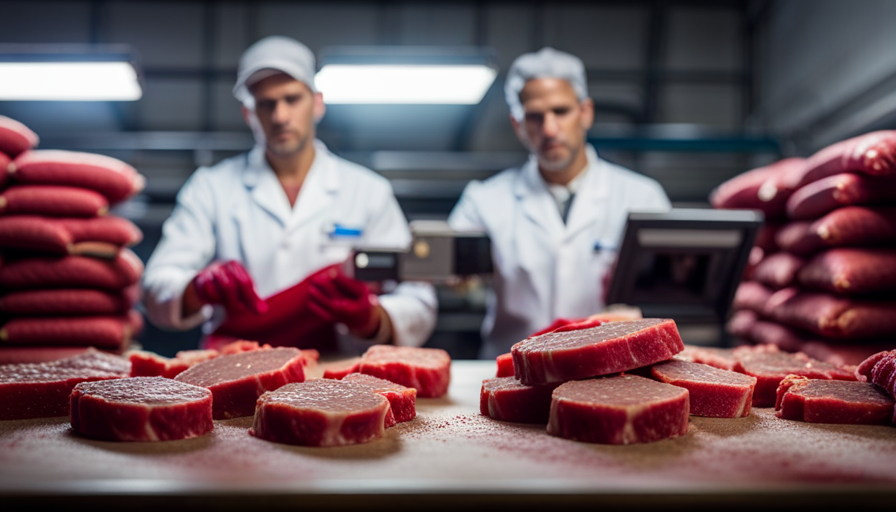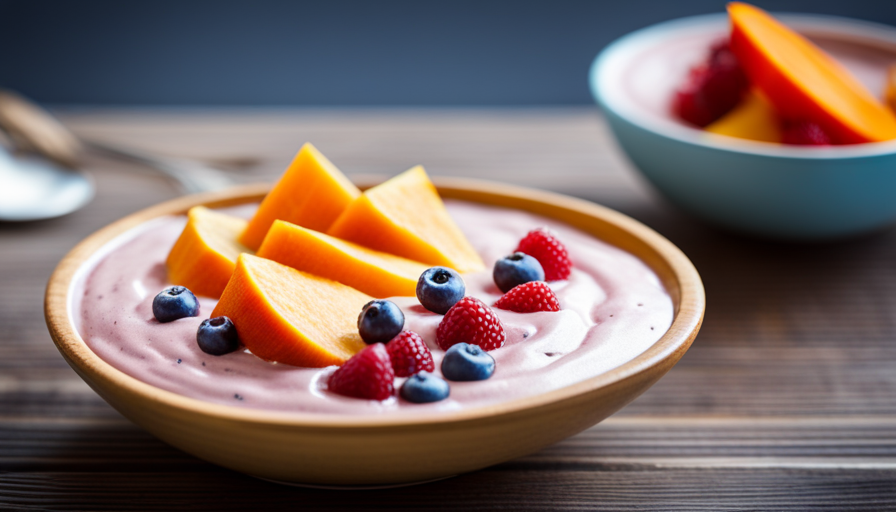Feeding your ferret a raw food diet is equivalent to providing them with a key to maximum health and energy. Just as a balanced meal benefits your own body, a raw food diet supplies your furry companion with the essential nutrients for a vibrant life.
But where do you start? Don’t worry, we’ve got you covered. In this comprehensive guide, you’ll learn everything you need to know about feeding ferrets a raw food diet.
From understanding their nutritional needs to transitioning them from their current diet, we’ll walk you through each step of the process. You’ll discover how to select high-quality ingredients, prepare and store raw food, and overcome common challenges.
We’ll also delve into the importance of introducing variety and supplementing their diet for optimal nutrition.
So, if you’re ready to give your ferret the best diet possible, grab your apron and let’s get started on this raw food adventure together!
Key Takeaways
- Feeding ferrets a raw food diet promotes optimal health and vitality.
- Consultation with a veterinarian or ferret nutrition specialist is essential for a balanced and nutritious diet.
- Taurine is a crucial nutrient for ferrets and must be provided through their diet.
- Proper hygiene should be practiced when preparing raw food, and it should be stored correctly in the freezer.
The Benefits of a Raw Food Diet for Ferrets
Feeding your ferret a raw food diet can significantly improve their health and wellbeing, giving you peace of mind and a happy, thriving pet. The importance of proper meal planning can’t be overstated when it comes to a raw food diet for ferrets. By carefully selecting and preparing their meals, you can ensure that your ferret receives all the essential nutrients they need for optimal health.
One of the main benefits of a raw food diet is that it closely mimics what ferrets would eat in the wild. This means that they’re getting a diet that’s more natural and biologically appropriate for their species. Raw food diets are typically high in protein, which is crucial for ferrets as they’re obligate carnivores. It provides them with the necessary energy to maintain their active lifestyle.
However, it’s important to note that there are potential risks and precautions associated with a raw food diet for ferrets. Raw meat can carry bacteria, such as salmonella, which can be harmful to both your ferret and yourself. It’s crucial to handle and store raw food properly to minimize the risk of contamination. Additionally, it’s essential to consult with a veterinarian or a ferret nutrition specialist to ensure that your ferret’s diet is balanced and meets their specific nutritional needs.
A raw food diet can offer numerous benefits for your ferret’s health and wellbeing. However, it’s essential to plan their meals carefully and take necessary precautions to minimize the potential risks associated with raw feeding. By doing so, you can provide your ferret with a diet that closely resembles their natural diet and promotes their overall health and happiness.
Understanding the Nutritional Needs of Ferrets
To truly understand what your furry companions require to thrive, it’s essential to delve into the intricacies of their unique nutritional needs. When it comes to feeding ferrets a raw food diet, it’s important to have a deep understanding of their digestive system and the essential nutrients they need to stay healthy.
Ferrets have a short and simple digestive system, similar to that of carnivores. They have a high metabolic rate and require a diet that is rich in animal protein and fat. Raw food diets for ferrets should consist primarily of whole prey, such as mice or chicks, as well as muscle meat, organs, and bones. These whole foods provide the essential nutrients that ferrets need to thrive.
One of the most crucial nutrients for ferrets is taurine. Taurine is an amino acid that is essential for their overall health. It plays a vital role in their vision, heart function, and reproductive system. Since ferrets cannot produce taurine on their own, it must be provided through their diet.
In addition to taurine, ferrets also require other essential nutrients like vitamin A, vitamin D, and omega-3 fatty acids. These nutrients are important for their immune system, bone health, and overall wellbeing.
Understanding the nutritional needs of ferrets is crucial when feeding them a raw food diet. By providing them with the right balance of nutrients, you can ensure that they stay healthy and happy.
Transitioning Your Ferret to a Raw Food Diet
When you first introduce your furry friend to a natural, unprocessed meal, their taste buds will embark on a delicious adventure of discovery! Transitioning your ferret to a raw food diet may seem daunting, but with patience and the right approach, it can be a smooth process. Here are some important steps to consider:
-
Gradual Transition: Start by mixing a small amount of raw food with their current diet and gradually increase the proportion over time. This will help your ferret adjust to the new taste and texture.
-
Variety is Key: Offer a variety of raw meats, organs, and bones to ensure your ferret receives a balanced diet. This will also keep them interested and excited about their meals.
-
Monitor Their Health: During the transitioning process, closely monitor your ferret’s weight, stool consistency, and overall health. Any sudden changes should be addressed with a veterinarian to ensure their well-being.
-
Potential Obstacles: Some ferrets may be resistant to change and may experience digestive upset during the transition. Patience is key, and if any issues arise, consult with a ferret-savvy veterinarian for guidance.
-
Seek Professional Advice: It’s always beneficial to consult with a veterinarian or a ferret nutrition specialist to ensure you’re meeting your ferret’s specific nutritional needs.
By following these steps and being patient with the transitioning process, you can successfully introduce your ferret to a raw food diet and provide them with a nutrient-rich and species-appropriate meal.
Selecting High-Quality Ingredients for Your Ferret’s Meals
Ensure your furry friend’s meals are packed with nutrition by carefully selecting high-quality ingredients for their meals. Choosing appropriate proteins is crucial when feeding your ferret a raw food diet. Ferrets are obligate carnivores, which means they require a diet that consists mainly of meat. When selecting proteins, opt for high-quality sources such as chicken, turkey, beef, or rabbit. These proteins should be the primary ingredient in your ferret’s meals to ensure they’re getting the necessary nutrients.
Sourcing fresh ingredients is also essential for your ferret’s raw food diet. Look for ingredients that are fresh, free from preservatives, and ideally organic. Fresh meats should be sourced from reputable suppliers to ensure they’re safe for your ferret to consume. Additionally, including organs such as liver and heart in your ferret’s diet can provide essential nutrients like vitamins and minerals.
It’s important to note that some ingredients, like fish, should be given in moderation due to their high levels of mercury. Always consult with your veterinarian to ensure you’re providing a balanced and appropriate diet for your ferret. By carefully choosing high-quality proteins and sourcing fresh ingredients, you can help ensure your ferret’s raw food diet is packed with the nutrition they need to thrive.
Preparing and Storing Raw Food for Your Ferret
Are you ready to start prepping and storing your ferret’s homemade meals to keep them healthy and satisfied? Here’s a step-by-step guide to help you with preparing and storing raw food for your ferret:
-
Choose fresh and high-quality ingredients: Select meats like chicken, turkey, or rabbit, along with organ meats and bones. Avoid using ingredients that’re spoiled or past their expiration date.
-
Practice proper hygiene: Wash your hands thoroughly before and after handling raw food to prevent the spread of bacteria. Clean all utensils, cutting boards, and surfaces used to prepare the food.
-
Prepare the food: Cut the meat into small, bite-sized pieces and mix in the appropriate amount of organ meats and bones. You can also add supplements like fish oil or taurine to ensure your ferret gets all the necessary nutrients.
-
Store the food correctly: Divide the prepared food into individual meal-sized portions and place them in airtight containers or sealable bags. Store ’em in the freezer to maintain freshness and prevent bacterial growth. Thaw each portion before feeding it to your ferret.
By following these steps, you can ensure that your ferret receives a nutritious and balanced diet while minimizing the risk of foodborne illnesses. Happy feeding!
Monitoring Your Ferret’s Health and Well-being on a Raw Food Diet
Monitoring Your Ferret’s health and well-being on a raw food diet can help you understand the impact of their nutrition on their overall vitality.
One important aspect to monitor is your ferret’s weight. Regularly weighing your ferret will allow you to track any changes and ensure they’re maintaining a healthy weight. If you notice any significant weight loss or gain, it could indicate an issue with their diet or health, and you should consult a veterinarian.
Another crucial aspect of monitoring your ferret’s health on a raw food diet is to watch for signs of nutrient deficiencies. While a raw food diet can provide many essential nutrients, it’s important to ensure your ferret is receiving a balanced diet. Look out for signs such as a dull coat, lethargy, poor appetite, or digestive issues. These could be indicators of deficiencies in certain vitamins or minerals.
To monitor your ferret’s health and well-being effectively, it’s essential to maintain open communication with your veterinarian. They can provide guidance on what to look for and recommend any necessary supplements to ensure your ferret is getting all the nutrients they need.
By closely monitoring their weight and watching for signs of nutrient deficiencies, you can ensure your ferret stays healthy and vibrant on a raw food diet.
Common Challenges and Solutions for Feeding Ferrets Raw Food
Now that you understand the importance of monitoring your ferret’s health and well-being on a raw food diet, let’s dive into the common challenges and solutions associated with feeding ferrets raw food.
One of the main challenges of sourcing raw food for your ferret is ensuring that you are providing a balanced and varied diet. It can be difficult to find a reliable source for high-quality prey items and other necessary components of a raw food diet. Additionally, some ferrets can be picky eaters and may refuse to eat certain types of raw food.
To address these challenges, it is important to establish a good relationship with a trusted supplier who can provide you with a consistent source of high-quality prey items. This will ensure that your ferret receives the essential nutrients they need.
If your ferret is a picky eater, you can try offering a variety of different prey items to entice them. You may also need to experiment with different textures and flavors to find what they prefer. Additionally, mixing small amounts of raw food into their regular diet can help them gradually transition to a raw food diet.
By being proactive in addressing these challenges and finding suitable solutions, you can successfully feed your ferret a raw food diet and ensure their optimal health and well-being.
| Challenges of Sourcing Raw Food | Solutions for Picky Eaters |
|---|---|
| Finding a reliable source for high-quality prey items | Establish a good relationship with a trusted supplier |
| Ferrets refusing to eat certain types of raw food | Offer a variety of different prey items and experiment with textures and flavors |
| Ensuring a balanced and varied diet | Mix small amounts of raw food into their regular diet and gradually transition them |
Introducing Variety in Your Ferret’s Raw Food Diet
To make mealtime more exciting for your furry friend, you can introduce a wide range of flavors and textures to keep their taste buds entertained. Introducing new ingredients is a great way to add variety to your ferret’s raw food diet. However, it’s important to do so gradually to avoid any digestive upsets.
Start by adding small amounts of new ingredients, such as different types of meat or organs, to their regular meals. Over time, you can increase the amount of new ingredients and even try different combinations to keep things interesting.
Balancing nutrients is crucial when introducing variety to your ferret’s raw food diet. Make sure to include a variety of protein sources, such as chicken, turkey, and beef, to provide essential amino acids. Additionally, include a variety of organs, such as liver and kidney, to ensure your ferret gets the necessary vitamins and minerals. You can also incorporate small amounts of fruits and vegetables, such as apples or carrots, to add a different texture and provide additional nutrients.
Remember to monitor your ferret’s health and adjust their diet accordingly. If you notice any digestive issues or changes in appetite, consult with a veterinarian to ensure your ferret is getting the proper balance of nutrients. With careful planning and a little experimentation, you can introduce variety into your ferret’s raw food diet and keep them happy and healthy.
Supplementing Your Ferret’s Diet for Optimal Nutrition
Make sure you’re giving your furry friend the best chance at a long, healthy life by supplementing their diet with essential nutrients. While a raw food diet provides many of the necessary nutrients for your ferret, it’s important to be aware of potential nutritional deficiencies and consider supplement options to ensure optimal nutrition.
One important supplement to consider is taurine, an essential amino acid for ferrets. Taurine deficiency can lead to serious health issues, including heart disease and blindness. To prevent this, you can add taurine supplements to your ferret’s diet.
Another crucial supplement is vitamin E, which helps support your ferret’s immune system and protects against oxidative stress. You can find vitamin E in various forms, such as capsules or liquid, and add it to their food.
Additionally, omega-3 fatty acids are beneficial for your ferret’s skin, coat, and overall health. You can include fish oil or flaxseed oil as a source of omega-3s in their diet.
Lastly, probiotics can help maintain a healthy gut flora, supporting digestion and preventing gastrointestinal issues. Look for probiotic supplements specifically formulated for ferrets.
By incorporating these supplement options, you can ensure that your ferret receives all the necessary nutrients and avoid potential nutritional deficiencies. Remember to consult with your veterinarian for specific dosage recommendations and to monitor your ferret’s overall health and well-being.
Tips for Successfully Feeding Ferrets a Raw Food Diet
Are you ready to embark on a ferret feeding adventure that’ll keep your furry friend healthy and happy? Feeding your ferret a raw food diet can provide numerous benefits and ensure they receive optimal nutrition.
One important aspect to consider is establishing a feeding schedule. Ferrets thrive on routine, so it’s crucial to feed them at the same time every day. This’ll help regulate their digestion and prevent any potential health issues.
When it comes to the actual raw food, there are several benefits to keep in mind. Raw food diets for ferrets mimic their natural diet in the wild, providing them with the necessary nutrients and enzymes. This can lead to improved digestion, healthier skin and coat, and increased energy levels. Additionally, raw food diets can help prevent dental issues, as the natural chewing action helps keep their teeth clean.
To successfully feed your ferret a raw food diet, it’s important to source high-quality ingredients. Look for human-grade meats and organs, as well as a variety of prey items like mice or chicks. It’s crucial to ensure that the raw food is properly balanced to meet your ferret’s nutritional needs. Consulting with a veterinarian or a knowledgeable ferret nutritionist can be helpful in creating a balanced raw food diet.
Establishing a feeding schedule and understanding the benefits of a raw food diet are key to successfully feeding your ferret. By providing them with the proper nutrition, you can ensure their overall health and well-being.
Frequently Asked Questions
Can I feed my ferret a raw food diet if they have specific dietary restrictions or health issues?
If your ferret has specific dietary restrictions or health issues, it’s still possible to feed them a raw food diet with some modifications. Feeding ferrets with dietary restrictions may require avoiding certain ingredients or adjusting the ratios of nutrients. However, it’s important to consult with a veterinarian or a ferret nutritionist to ensure that your ferret’s specific needs are met. Ferret raw food diet alternatives, such as cooked or freeze-dried options, can also be considered to provide a balanced and appropriate diet for your furry friend.
How often should I rotate the ingredients in my ferret’s raw food diet to provide variety?
To provide variety in your ferret’s raw food diet, it’s recommended to rotate the ingredients regularly. This helps prevent nutrient deficiencies and boredom. Aim to introduce a new ingredient every one to two weeks. Start by adding a small amount of the new ingredient and gradually increase it over a few days. Observe your ferret’s reaction and monitor for any digestive issues.
Remember, variety is essential for a balanced diet and optimal health for your furry friend.
Is it necessary to add supplements to my ferret’s raw food diet, or can they get all the necessary nutrients from the food alone?
You should consider adding supplements to your ferret’s raw food diet to ensure they receive all the necessary nutrients. While a raw food diet can provide many benefits, there’s a risk of nutritional deficiencies if it’s not properly balanced. Supplements can help fill any gaps in their diet, providing essential vitamins and minerals. It’s important to consult with a veterinarian or a knowledgeable ferret expert to determine the specific supplements your ferret may need.
What are some common mistakes to avoid when preparing and storing raw food for my ferret?
When preparing and storing raw food for your ferret, it’s crucial to avoid common mistakes. Firstly, ensure you properly wash and sanitize all utensils and surfaces to prevent contamination.
Secondly, use high-quality ingredients and avoid foods that are toxic to ferrets, such as onions and garlic.
Lastly, store the raw food in airtight containers in the refrigerator or freezer to maintain freshness and prevent bacterial growth.
By following these guidelines, you can provide a safe and nutritious diet for your ferret.
How do I know if my ferret is getting all the necessary nutrients on a raw food diet, and what signs should I look out for if they are not?
To ensure your ferret is getting all the necessary nutrients on a raw food diet, it’s important to know the signs of nutrient deficiency. Look out for symptoms like weight loss, dull coat, diarrhea, and lethargy.
To balance a raw food diet for ferrets, include a variety of proteins like chicken, turkey, and beef. Add organ meats and bones for essential vitamins and minerals. Incorporate fruits and vegetables in moderation for added nutrients.
Regularly monitor your ferret’s health and consult with a veterinarian for guidance.
Can Feeding Ferrets a Raw Food Diet Be Compared to Crafting Raw Food in Minecraft?
Feeding ferrets a raw food diet can be compared to crafting raw food in Minecraft. In both cases, the focus is on providing essential nutrients and ensuring a balanced diet. Just like giving yourself raw food in Minecraft, it’s important to consider the ingredients and their nutritional value when feeding ferrets.
Conclusion
In conclusion, feeding your ferret a raw food diet is a wise choice that can bring about numerous benefits. By understanding their nutritional needs and carefully selecting high-quality ingredients, you can ensure optimal health for your furry friend.
Although there may be some challenges along the way, introducing variety and supplementing their diet will provide them with the best nutrition possible. With a little effort and dedication, you can successfully nourish your ferret with a raw food diet and watch them thrive. Your furry companion will thank you for it.










